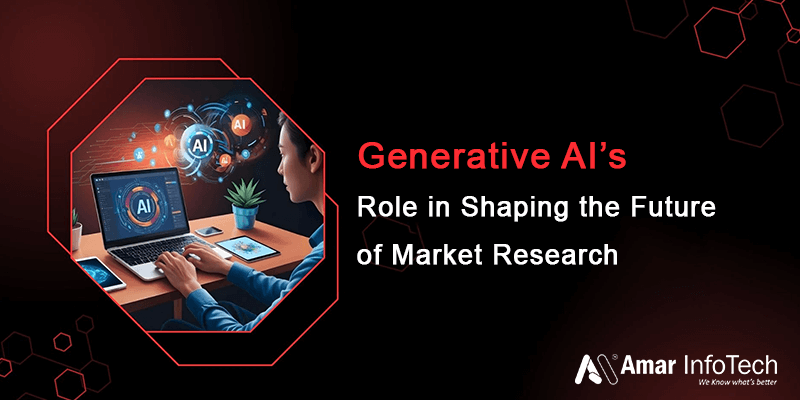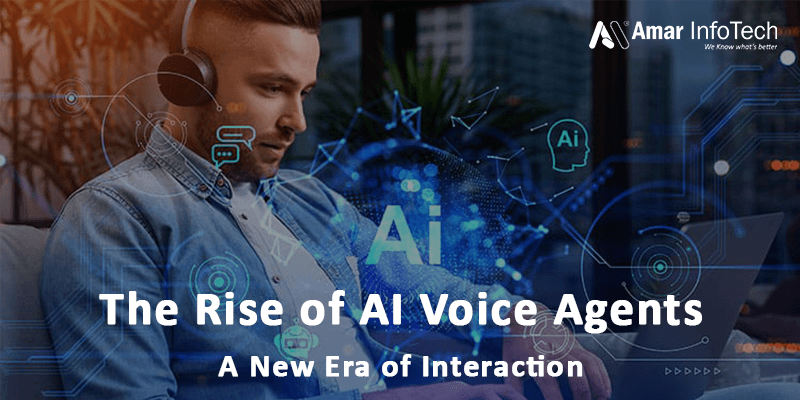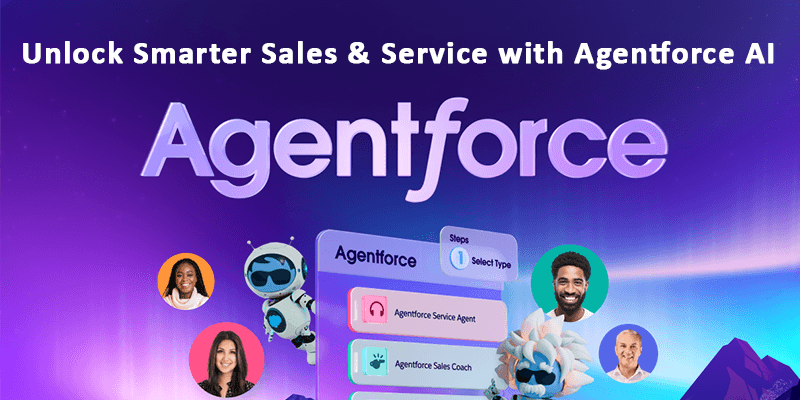Ready for Digital Transformation? Your Vision, Our Expertise - Let’s Build Innovative Software Together!
Generative AI’s Role in Shaping the Future of Market Research
 Blog Future of AI
Blog Future of AI
In recent years, the rapid advancements in Artificial Intelligence (AI) have transformed various industries, and market research is no exception. Among the most promising innovations in the AI space is Generative AI, which has the potential to reshape how businesses in the USA understand their customers, predict trends, and drive growth. As American companies increasingly turn to data-driven insights, generative AI is proving to be a game-changer in the world of market research.
What is Generative AI and Why is It Important for Market Research?
- Generative AI refers to AI models capable of creating new content, such as text, images, and data, based on patterns learned from existing information.
- In market research, it enables businesses to analyze massive datasets, uncover hidden trends, and generate actionable insights faster than traditional methods.
For American companies, this means having the ability to predict market behavior, assess customer sentiment, and refine marketing strategies, all in real-time.
1. Personalized Consumer Insights
- Enhanced customer segmentation: Generative AI can aggregate data from various touchpoints—social media, customer interactions, and transaction data—to generate accurate consumer profiles.
- Predictive behavior analysis: By analyzing consumer behavior patterns, generative AI helps predict what products, services, or experiences will resonate with specific market segments.
- Targeted offerings: This allows businesses to design products or services tailored to individual preferences, leading to improved customer engagement and loyalty.
2. Improved Predictive Analytics
- Forecasting trends: Generative AI can predict which products or services will gain traction in the market by analyzing historical data and customer behavior.
- Understanding shifts in demand: Companies in the USA can better anticipate changes in demand, allowing them to prepare and adjust strategies proactively.
- Optimized pricing strategies: AI can analyze market dynamics, competitor pricing, and consumer preferences to optimize pricing strategies in real time.
3. Streamlining Data Analysis
- Automating data processing: Generative AI can automate the extraction, cleansing, and analysis of data, significantly reducing the time spent on manual tasks.
- Comprehensive insights: AI tools can generate complex reports, analyze survey results, and interpret large volumes of unstructured data, helping businesses gain a deeper understanding of the market.
- Resource efficiency: This allows market researchers to focus on high-level analysis and strategy, rather than getting bogged down in data preparation.
4. Real-Time Market Research
- Instant insights: Generative AI enables businesses to access real-time insights about customer behavior, product performance, and market conditions.
- Quick adaptation: Whether tracking the performance of a marketing campaign or responding to market shifts, companies can make immediate adjustments to optimize strategies.
- Enhanced decision-making: Real-time market research empowers businesses to react swiftly to changing conditions, making them more agile and competitive.
5. Uncovering Hidden Patterns and Trends
- Data-driven discoveries: Generative AI analyzes data across various industries, allowing businesses to identify emerging trends and consumer behaviors that were previously unnoticed.
- Advanced pattern recognition: With the ability to process complex datasets, AI can detect subtle patterns and correlations that may not be immediately apparent to human analysts.
- Market opportunity identification: By uncovering hidden opportunities, businesses in the USA can innovate and develop products or services that meet unaddressed needs in the market.
6. Cost-Effective Market Research
- Reduced reliance on traditional methods: Generative AI helps reduce the dependence on traditional market research methods, such as focus groups and surveys, which can be costly and time-consuming.
- Lower operational costs: Automating data analysis and report generation leads to significant cost savings for businesses, particularly in industries like retail, healthcare, and finance.
- Scalable solutions: As AI can handle large volumes of data and research across multiple sectors, businesses can scale their market research efforts without additional resources.
Ethical Considerations and Challenges
- Data privacy concerns: Generative AI relies on consumer data, and businesses must ensure that data collection and usage comply with regulatory frameworks.
- Avoiding algorithmic bias: AI models must be trained on diverse datasets to avoid biases that could skew insights or harm consumer trust.
- Transparency and accountability: Clear guidelines and processes should be implemented to ensure transparency in AI-driven research processes.
7. The Future of Market Research in the USA
- Increased adoption: As generative AI becomes more accessible, businesses across sectors will increasingly rely on it to guide strategic decisions.
- Integration with other technologies: The future of market research will involve integrating generative AI with other technologies like Internet of Things (IoT) and 5G, further enhancing data collection and analysis capabilities.
- AI-driven innovation: By leveraging generative AI, businesses can not only optimize their market research but also drive innovation in product development, customer experience, and service offerings.
For businesses in the USA, adopting generative AI for market research is no longer a luxury—it’s a necessity. Companies that embrace this technology will be better positioned to understand their customers, anticipate trends, and innovate more effectively. As the demand for personalized experiences and data-driven decisions grows, generative AI will undoubtedly be at the heart of the next wave of market research innovation.
Conclusion
Generative AI is fundamentally transforming market research, especially for businesses in the USA. By leveraging its capabilities, companies can unlock deeper insights, optimize strategies, and make data-driven decisions that drive growth. As the technology evolves, it will continue to provide more personalized and actionable market intelligence, allowing businesses to stay ahead of the competition. The future of market research lies in the ability to harness the power of generative AI to better understand consumer needs, predict trends, and deliver innovative products and services.





